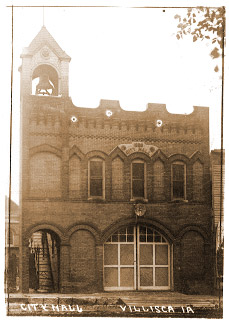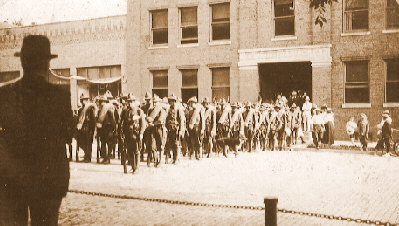|
A Brief History of Villisca,
Iowa
Our city began as a small settlement called The Forks,
positioned between the Middle and West Nodaway River. The first plat of the town was laid
out in 1858 by D. N. Smith of the Chicago, Burlington, and Quincy (C.B.&Q.) Railroad.
He named the town Villisca, which he said meant "pretty place" or "pleasant
view" in the language of the area's original Native American inhabitants.
| The town flourished and by the early 1900s 2,500
people called it home. Several hotels, restaurants, stores, theaters, and
manufacturers complemented an economy based largely on agriculture. More than two
dozen passenger and freight trains stopped at the depot each day, sustained the town's
growth, and promised a bright future. Tragedy
struck on June 10, 1912 when townspeople discovered the Josiah Moore family of six and the
two visiting Stillinger girls had been murdered while they slept. The still-unsolved
crime became known as the Villisca Axe Murders and the resulting investigation and trials
split the community over the guilt or innocence of a local suspect. While the town is not
proud of this dark chapter in our past, we acknowledge ongoing interest in historical
inquiry and discourage sensationalizing the crime. |

|
The community has a proud military history
beginning with the construction in 1912 of Iowa's only publicly funded and longest
operating Armory on the north side of the town square. Villisca's Company F has
represented the community, the state, and the country in the 1916 expedition into Mexico,
World War One, World War Two, Korea, and Vietnam. Villisca is the site of a
Pulitzer Prize winning photo depicting Lt. Col. Robert Moore greeting his family at the
depot after returning from service in Africa. The photo appears in the July 26, 1943
issue of Life Magazine.
 |
Like all communities, Villisca's history has
been a combination of happiness and sadness, success and failure, and tragedy and
triumph. Our story is unique and understanding the history of our community and its
people is an essential part of our journey into the future. |
History Menu |